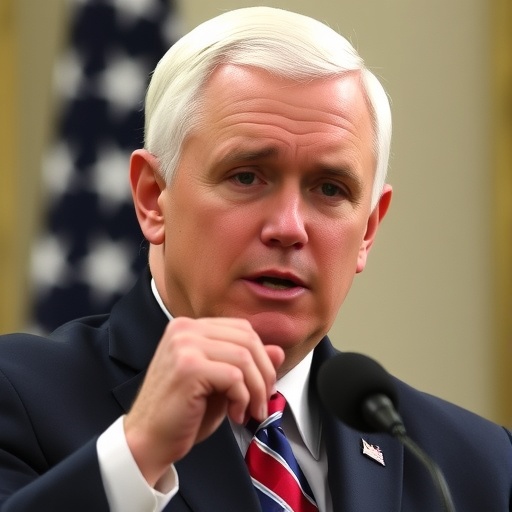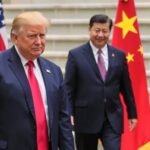Exclusive: Mike Pence‘s Unpublished Notes Expose Trump’s ‘Wimp’ Insult and Jan. 6 Pressure Tactics
In a stunning revelation that could reshape historical narratives around the 2020 election, newly surfaced unpublished notes from former Vice President Mike Pence detail intense pressure from Donald Trump to derail the certification of Joe Biden’s victory. The handwritten documents, kept private until now, capture Trump labeling Pence a ‘wimp’ during heated exchanges just days before the Jan. 6 Capitol riot. These notes were poised to serve as pivotal evidence in the federal case against Trump, which was ultimately dismissed amid debates over presidential immunity. This disclosure not only humanizes the behind-the-scenes turmoil but also reignites questions about accountability in American democracy.
- Pence’s Secret Scribbles: Documenting Trump’s Election Overturn Demands
- From Oval Office to Capitol Steps: The Timeline of Trump’s Pressure Campaign
- Jan. 6 Chaos: How Pence’s Defiance Shaped the Capitol Assault
- Presidential Immunity Debate: Notes’ Role in Trump’s Legal Shield
- Looking Ahead: Electoral Reforms and the Shadow of 2024
The emergence of Pence’s notes comes at a time when the nation grapples with the legacy of January 6, 2021, when a mob of Trump supporters stormed the U.S. Capitol, disrupting the joint session of Congress tasked with the election certification. Pence, presiding over the proceedings, became a central figure in the drama, steadfastly refusing to yield to Trump’s entreaties. Legal experts suggest these documents could influence ongoing state-level probes and future political reckonings, underscoring the fragility of electoral processes.
According to sources familiar with the notes, Pence meticulously recorded conversations from late December 2020 into early January 2021, capturing Trump’s frustration and escalating demands. One entry reportedly quotes Trump saying, ‘You’re a wimp, Mike. If you don’t fight like hell, you’ll regret it.’ This personal attack highlights the deteriorating relationship between the two men, once allies in the White House, now emblematic of a divided Republican Party.
Pence’s Secret Scribbles: Documenting Trump’s Election Overturn Demands
At the heart of Pence’s unpublished notes lies a chronological account of Trump’s relentless campaign to influence the election certification process. Written in Pence’s distinctive longhand on legal pads and scrap paper, the notes span over a dozen pages and include timestamps, direct quotes, and Pence’s own reflections. Sources indicate that Pence began documenting these interactions after Trump’s public statements began veering into dangerous territory, such as his December 19, 2020, tweet urging supporters to ‘fight like hell’ and promising a ‘wild’ event on January 6.
One particularly damning entry from December 28, 2020, describes a phone call where Trump allegedly pressed Pence to reject electoral votes from key battleground states like Arizona, Georgia, and Pennsylvania. ‘Mike, you have the power to send it back to the states,’ Trump is quoted as saying. Pence’s response in the notes: ‘The Constitution doesn’t give the VP that authority.’ This exchange underscores Trump’s misunderstanding—or willful ignorance—of the vice president’s ceremonial role in the Electoral Count Act of 1887, which Pence later cited in his refusal to intervene.
The notes also reveal Trump’s invocation of loyalty, with phrases like ‘After all I’ve done for you’ and ‘The base will never forgive you.’ Pence, a devout Christian known for his measured demeanor, jotted down his internal resolve: ‘I cannot and will not break my oath.’ Historians familiar with the documents compare them to the Watergate-era tapes, noting their potential to provide unfiltered insight into executive overreach.
Legal analysts, including those from the Brookings Institution, emphasize that these notes could have been ‘smoking gun’ evidence in the federal indictment against Trump, which charged him with conspiracy to defraud the United States. Although the case was dismissed by the Supreme Court in a 6-3 ruling on presidential immunity for ‘official acts,’ lower courts are still debating whether Trump’s pressure on Pence qualifies as such. ‘These notes blur the line between official duty and personal vendetta,’ said Professor Laurence Tribe of Harvard Law School in a recent interview.
From Oval Office to Capitol Steps: The Timeline of Trump’s Pressure Campaign
The pressure on Mike Pence did not erupt overnight; it built over weeks as Donald Trump refused to concede the 2020 election despite multiple recounts and court rulings affirming Biden’s win. Pence’s notes trace this escalation, starting with subtle nudges in mid-December and culminating in frantic Oval Office meetings on January 4 and 5, 2021.
On December 15, as the Electoral College formally cast votes, Trump’s team, including Rudy Giuliani and John Eastman, drafted memos arguing Pence could unilaterally discard slates of electors. Pence’s notes from a December 20 meeting with Eastman quote the lawyer saying, ‘It’s your call, Mr. Vice President.’ Pence scribbled his rebuttal: ‘No legal basis—pure fantasy.’ This foreshadowed the infamous Eastman memo, later subpoenaed by the January 6 Committee, which proposed Pence declaring Trump the winner if he rejected enough Biden votes.
By January 4, with the rally planned for the Ellipse, Trump’s rhetoric intensified. Notes describe a 45-minute call where he accused Pence of disloyalty: ‘You’re letting the steal happen.’ Pence recorded his reply: ‘Sir, the electors are certified by Congress.’ The following day, January 5, in the Oval Office, Trump reportedly handed Pence a draft letter to Congress asserting fraud claims. ‘Sign this, Mike, and be a hero,’ Trump urged, per the notes. Pence demurred, leading to the ‘wimp’ epithet.
Statistics from the time paint a grim picture: Over 60 lawsuits challenging the election had been dismissed, and audits in Georgia confirmed Biden’s narrow victory. Yet Trump’s pressure persisted, fueled by allies like Mark Meadows, whose texts to Pence—’Please help us’—corroborate the notes. The January 6 Committee report, released in December 2022, referenced similar communications, but Pence’s personal records add a raw, firsthand layer.
Experts like Barbara Perry from the University of Virginia’s Miller Center note that Pence’s documentation reflects a vice president’s constitutional duty. ‘In times of crisis, such records preserve the rule of law,’ she said. The notes also mention Pence’s consultations with Chief Justice John Roberts and Senate leaders, who reinforced his stance against any unilateral action.
Jan. 6 Chaos: How Pence’s Defiance Shaped the Capitol Assault
As Jan. 6 unfolded, Pence’s refusal to bend under Donald Trump‘s pressure became a flashpoint for the violence that ensued. His notes, written hurriedly during evacuations from the Capitol, capture the terror: ‘Shouts of ‘Hang Mike Pence’ echoing—Secret Service rushing us out.’ This visceral detail aligns with video footage and witness accounts from the bipartisan January 6 Select Committee.
Trump’s rally speech that morning, where he repeated calls to ‘fight like hell’ and march to the Capitol, directly preceded the breach. Pence’s pre-riot notes warn of potential unrest: ‘Trump’s words could incite—must proceed with certification.’ Indeed, at 1:25 p.m., as rioters breached barriers, Pence was in the Senate chamber, directing the evacuation. His notes detail a call from Trump at 2:24 p.m., relayed by aide Nick Luna: ‘Where’s Mike?’—a moment infamously captured in audio where Trump later expressed disappointment that the mob turned on Pence.
The assault resulted in five deaths, including Capitol Police Officer Brian Sicknick, and over 140 officers injured. More than 1,200 individuals have been charged in connection with the riot, with ongoing trials revealing coordination among Trump allies. Pence’s notes provide context for his post-riot actions: He reconvened the session at 8 p.m., certifying the votes state by state despite threats. ‘Duty calls,’ he wrote simply.
Public reaction was swift. Polls from Quinnipiac in January 2021 showed 56% of Americans blaming Trump for the violence, with Pence’s approval spiking among moderates. The notes also reference Pence’s family safety concerns, noting his daughter Charlotte’s evacuation and his wife’s prayers during the ordeal. This personal angle humanizes a story often reduced to political machinations.
Legal ramifications tied to election certification persist. The now-dismissed federal case, brought by Special Counsel Jack Smith, hinged on Trump’s alleged scheme to subvert the process. While immunity shielded ‘core’ presidential acts, Pence’s notes—potentially admissible as private reflections—could bolster arguments in Georgia’s RICO case against Trump, where similar pressure tactics are alleged.
Presidential Immunity Debate: Notes’ Role in Trump’s Legal Shield
The shadow of presidential immunity looms large over the significance of Pence’s notes. In Trump v. United States (2024), the Supreme Court ruled that presidents enjoy absolute immunity for official acts, presumptive immunity for others, and no immunity for unofficial conduct. Justice Sonia Sotomayor’s dissent warned this could enable ‘a king above the law,’ a critique echoed in analyses of Trump’s Jan. 6 actions.
Pence’s documents complicate this: Were Trump’s calls to Pence official communications or private bullying? Notes from a January 3 meeting with congressional leaders show Trump coordinating with House Speaker Kevin McCarthy and Senate Majority Leader Mitch McConnell, blurring lines. ‘This was state business,’ argued Trump’s lawyers in filings. Yet Pence’s private jottings, not part of official records, might evade immunity barriers.
Scholars like Jed Shugerman from Fordham Law argue the notes ‘expose the unofficial nature of the pressure,’ potentially viable in civil suits or state prosecutions. The dismissed federal case cited 34 felony counts, including obstruction of an official proceeding—the very election certification Pence protected. With appeals pending, these notes could resurface in discovery.
Broader context includes Eastman’s disbarment proceedings in California, where Pence’s testimony referenced similar notes. ‘They confirm the plot’s audacity,’ said January 6 prosecutor William Burck. Public interest remains high; a 2023 Pew survey found 65% of Americans believe Trump bears responsibility for the riot.
Pence himself has remained largely silent post-vice presidency, focusing on his 2024 presidential bid before withdrawing. In a rare Fox News interview, he alluded to his notes: ‘History will judge based on facts, not fictions.’ Their publication now invites scrutiny of how one man’s resolve preserved democracy’s guardrails.
Looking Ahead: Electoral Reforms and the Shadow of 2024
As the 2024 election cycle heats up, Pence’s unpublished notes cast a long shadow over discussions of election certification integrity and presidential immunity. Bipartisan efforts, like the Electoral Count Reform Act signed in 2022, codify the vice president’s limited role, directly addressing the vulnerabilities exposed on Jan. 6. The law raises objection thresholds and clarifies procedures, reducing the risk of future disruptions.
Yet challenges persist. Trump’s ongoing influence in the GOP, including vows to ‘pardon’ Jan. 6 participants, signals unresolved tensions. Pence’s notes could inform congressional hearings or even inspire whistleblower protections for future officials. Legal watchers predict state cases in Arizona and Michigan will cite similar evidence, testing immunity’s boundaries.
Public discourse has evolved; a Monmouth University poll in July 2024 shows 72% support for holding leaders accountable for election interference. As Trump eyes a comeback, these revelations remind voters of the stakes. Pence’s quiet heroism, preserved in ink, may yet guide the nation’s path toward safeguarding its democratic institutions against authoritarian impulses.








